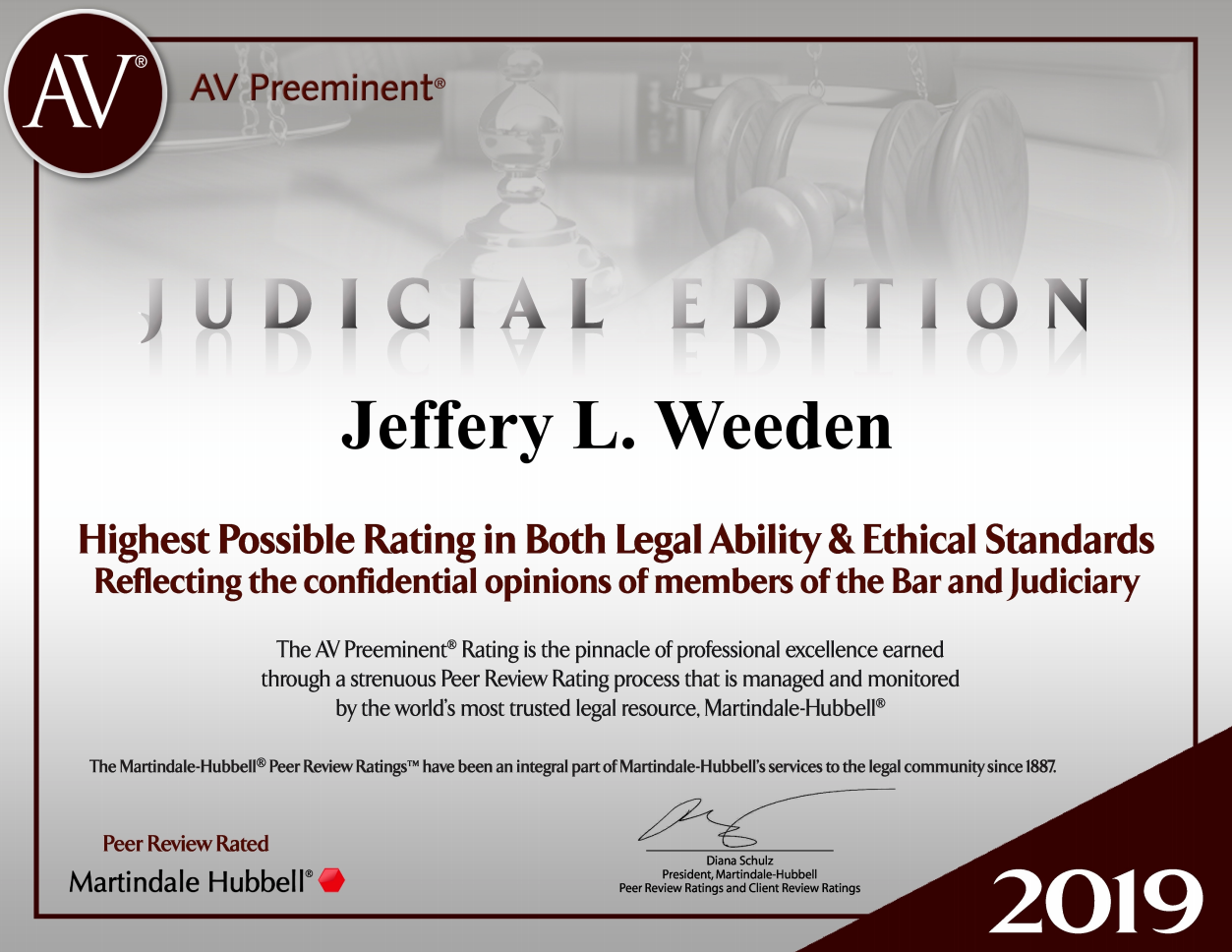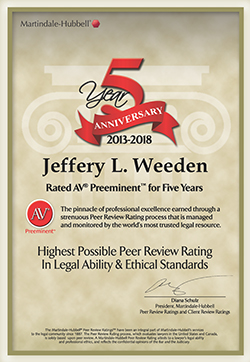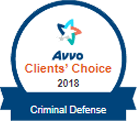Experienced Criminal Defense Attorney for Colorado Drug Possession Charges
If you’re facing drug possession charges in Denver, understanding your options and securing a strong Denver criminal defense lawyer can make all the difference. Colorado’s drug laws are complex, covering everything from recreational marijuana use to controlled substances and prescription medications.
Whether you’re dealing with charges involving illegal drugs, prescription drugs, or drug paraphernalia, Denver drug possession lawyer Jeff Weeden provides informed, compassionate representation that focuses on your unique situation. If you or someone you love is facing drug possession charges, contact WeedenLaw ASAP to start building your defense.
Call (720) 307-4330 or complete our online contact form to schedule your free initial consultation today.
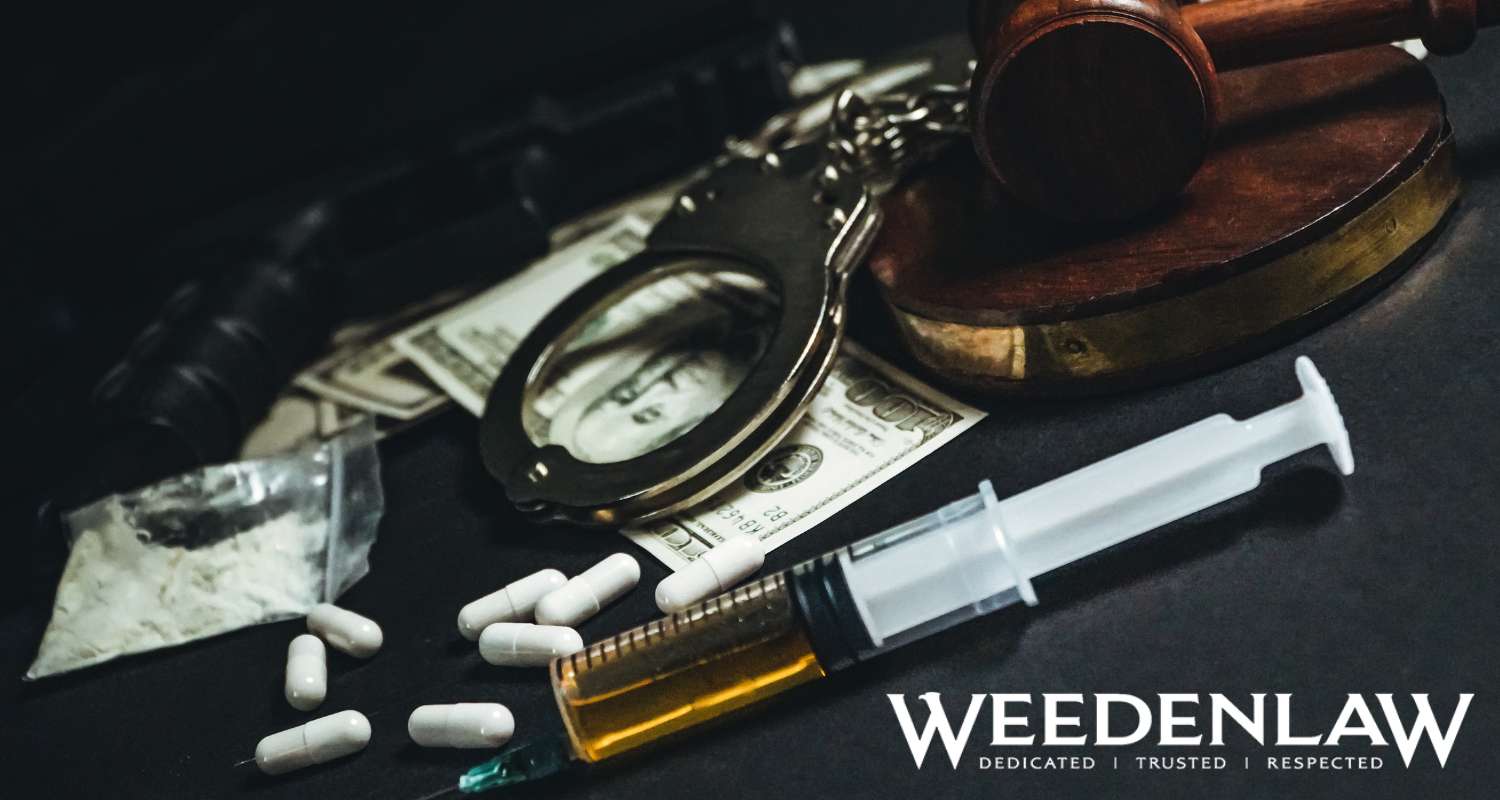
What Drugs are Legal in Colorado?
In Colorado, certain drugs are legal under specific circumstances, primarily due to the state’s progressive approach to recreational and medicinal marijuana. Colorado law permits adults aged 21 and older to possess up to one ounce of marijuana for personal use. Additionally, individuals with qualifying medical conditions may obtain a medical marijuana card, allowing them to purchase and possess larger quantities for medicinal purposes. However, there are restrictions on how much marijuana can be grown or purchased, and public use remains illegal.
Aside from marijuana, other drugs in Colorado are generally restricted to prescription use only. Prescription drugs, such as certain painkillers, sedatives, and treatments like anabolic steroids, are legal only when prescribed by a licensed medical professional. Drugs like opioids, classified under Schedule II due to their high potential for addiction, must be prescribed and monitored carefully.
It is illegal to possess, distribute, or use any other controlled substances without a valid prescription or outside approved medical uses, and Colorado law enforces strict penalties for violations involving illegal possession or distribution of controlled substances.
Drug Possession Laws in Colorado
Colorado’s drug possession laws are structured based on the type and quantity of the controlled substance involved. The United States Drug Enforcement Administration (DEA) organizes drugs into a “Controlled Substances Schedule,” which ranks substances from Schedule I to Schedule V.
This classification helps determine the severity of drug possession charges, as more dangerous or addictive drugs carry harsher penalties. Generally, the higher the schedule level, the more serious the criminal charges and consequences for drug possession.
Here’s a breakdown of Colorado’s controlled substance schedules:
- Schedule I Drugs: Substances with a high potential for abuse and no accepted medical use, such as heroin, LSD, and ecstasy. Possession of Schedule I drugs is often treated as a more serious criminal offense, leading to higher-level charges and stricter penalties.
- Schedule II Drugs: These drugs may have accepted medical uses under regulation, but have a potential for high psychological dependence, with some leading to serious physical and psychological dependence. Examples include cocaine, methamphetamine, and prescription opioids like oxycodone. Possession can result in significant drug crime charges, especially in cases involving larger quantities.
- Schedule III Drugs: Drugs in this category have a low to moderate physical dependence. Examples include anabolic steroids and medications with limited amounts of narcotics. Possession of Schedule III drugs may still lead to drug charges, though penalties are usually less severe than for Schedules I and II.
- Schedule IV Drugs: These drugs have a lower potential for abuse, including anti-anxiety medications like Xanax and Valium. Possession of Schedule IV drugs is still illegal without a prescription and can result in criminal charges, but generally with lesser penalties compared to higher schedules.
- Schedule V Drugs: These substances have the lowest potential for abuse and may include prescription cough syrups with small amounts of narcotics. While drug charges for possessing Schedule V drugs are generally less severe, they can still carry legal consequences.
Understanding controlled substance schedules is crucial when facing drug possession charges in Colorado. Knowing the type of substance involved can significantly impact the case if you or a loved one has been charged with possession. With in-depth knowledge of Colorado drug laws, Colorado drug defense attorney Jeff Weeden can guide you through your options and build a strong defense tailored to your case.
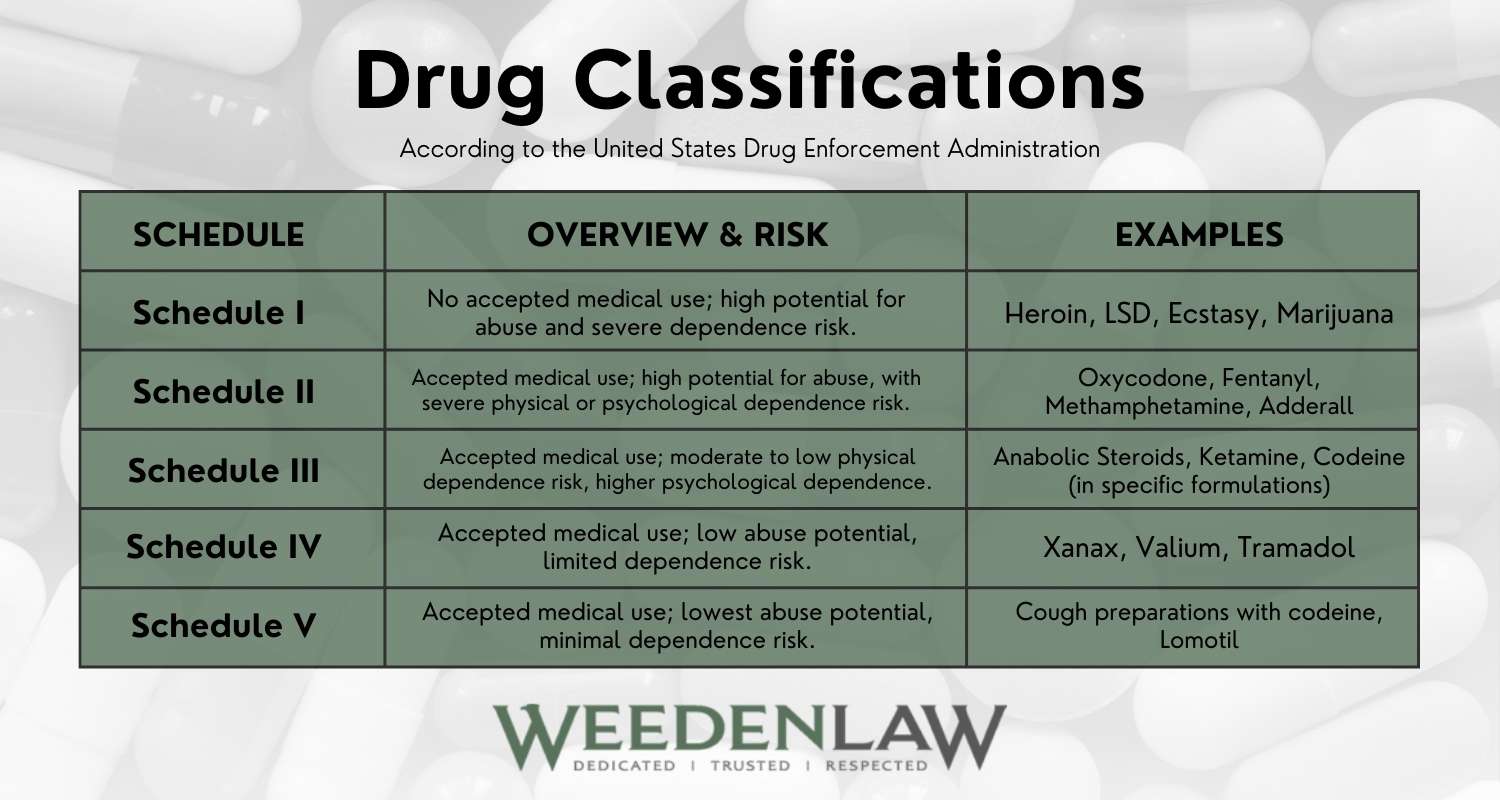
Simple Possession
Simple possession refers to drug offenses where an individual possesses a controlled substance intended solely for personal use rather than for distribution or sale. In Colorado, simple drug possession charges often vary depending on the type and quantity of the substance.
Penalties for simple possession in Colorado may include misdemeanor or felony charges depending on the substance involved and the individual’s prior criminal history. For example, possessing a small amount of a Schedule II drug, such as certain prescription painkillers, can lead to different penalties than having larger amounts associated with intent to distribute.
Constructive vs. Actual Possession
Colorado law distinguishes between constructive possession and actual possession, each with different implications for legal charges. Actual possession occurs when a controlled substance is found directly on an individual, such as in their pocket, purse, or hand. For instance, if law enforcement officers discover illegal drugs on a person during a search, this would be classified as actual possession, as the drugs are physically on the person and easily linked to them.
Constructive possession, on the other hand, refers to drug offenses where an individual may not have drugs on them directly but still has access or control over the area where the drugs are found. This might involve controlled substances discovered in a shared space, like a car’s glove compartment or a common area in a home.
Constructive possession can lead to drug charges if prosecutors can demonstrate that the individual was aware of the drugs and had the ability or intent to exercise control over them. This distinction is important in defending drug possession charges, as constructive possession cases often require more evidence to prove intent or awareness, opening potential avenues for defense.
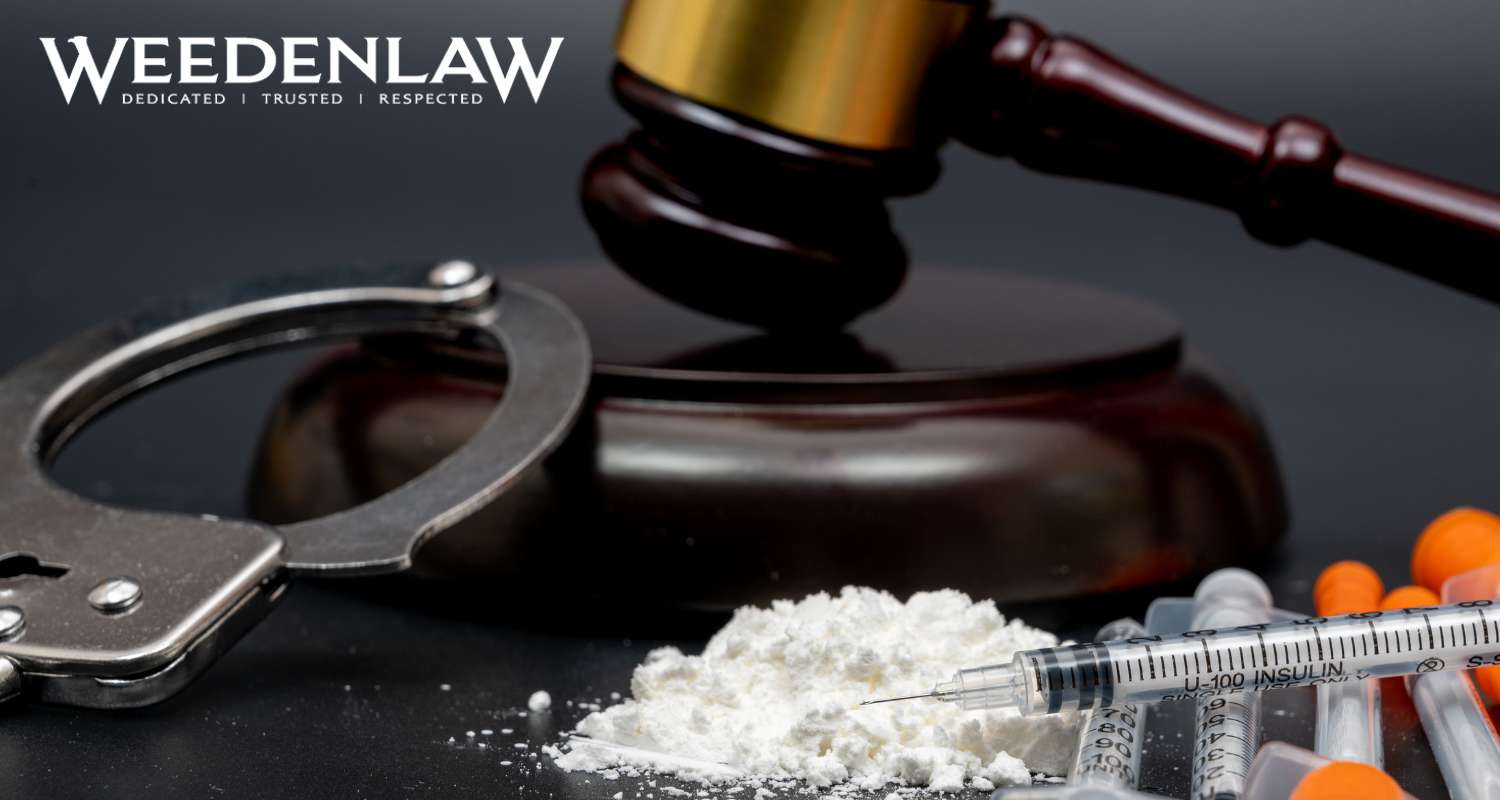
What are the Penalties for Drug Possession in Colorado?
In Colorado, drug possession penalties depend on the type and quantity of the controlled substance involved, as well as any prior criminal history.
Misdemeanors are generally associated with smaller quantities of less dangerous drugs or drugs with accepted medical uses, while felony drug charges apply to more significant amounts or serious drug crimes involving higher schedules, like Schedule II drugs or Schedule III drugs.
A misdemeanor drug charge can result in $1,000 in fines and two years of probation. If the person is found in possession of over four grams of serious drugs, like cocaine, ecstasy, PCP, or heroin, they can be charged with a drug felony, resulting in $1,000 in fines and between six months to one year in prison.
In addition to fines and a prison sentence, a drug conviction can impact a person’s life well beyond the courtroom. A drug crime conviction can negatively affect employment prospects, as many employers perform background checks and may be wary of hiring someone with a drug offense. Housing opportunities can also diminish, as landlords often consider a drug offense a liability.
The consequences of drug crimes in Colorado underscore the importance of seeking a Colorado drug defense attorney to address drug possession charges and reduce potential repercussions on one’s future.
Diversion Programs and Alternative Sentencing for Drug Possession Charges
Colorado provides diversion programs and alternative sentencing options for certain drug possession charges, allowing eligible defendants to seek treatment rather than face jail time. The drug court program is available to individuals struggling with substance abuse who meet specific criteria, such as being nonviolent offenders. Participants in drug court engage in mandatory treatment and regular court check-ins, and successful completion can lead to reduced charges or case dismissal.
For first-time offenders or those facing minor drug offenses, options like probation and deferred sentencing offer alternatives to incarceration. Probation allows individuals to serve their sentence under set conditions, such as attending substance abuse counseling, while deferred sentencing allows defendants to fulfill requirements, which can result in case dismissal if completed successfully.
At WeedenLaw, our experienced Denver drug crime lawyers help clients pursue these paths, aiming to reduce the long-term impact of a drug conviction through effective legal advocacy. To learn more about these sentencing alternatives, contact our law firm today to schedule a free consultation.
Can Drug Crimes in Colorado Be Expunged?
In Colorado, drug crimes may be eligible for expungement under certain circumstances, though options for record clearing are often limited. For many drug possession charges, particularly those resolved through diversion programs or alternative sentencing, individuals may have the opportunity to petition for expungement.
Successfully completing a diversion program like drug court can sometimes result in the dismissal of charges, allowing defendants to pursue record expungement. Clearing a drug conviction from one’s record can be invaluable, as it can improve employment opportunities, housing options, and access to educational resources.
However, the specific eligibility for expungement depends on the type of drug offense and case details, so it’s essential to consult with a knowledgeable Denver drug crime lawyer like Jeff Weeden to explore your options.

How a Denver Drug Possession Defense Lawyer at WeedenLaw Can Help
Denver drug possession defense lawyer Jeff Weeden provides clients with essential knowledge and experience when addressing Colorado drug laws and defending against drug possession charges. Jeff’s background in drug crime defense includes an in-depth understanding of controlled substance laws, criminal charges, and court proceedings in Colorado.
His client-centered approach means he conducts thorough investigations, examining every detail of the case, from the legality of search and seizure by law enforcement officers to potential weaknesses in the prosecution’s evidence. Denver drug crime lawyer Jeff Weeden carefully develops strategies to challenge drug charges, often seeking alternatives like drug court or diversion programs that focus on rehabilitation over punishment.
Dedicated to protecting his client’s futures, Jeff works tirelessly to minimize the consequences of a drug conviction. He supports clients through challenging times, providing compassionate representation that helps them move forward with their lives and avoid the long-term impacts of a drug charge.
Common Defenses Against Drug Possession Charges
When facing drug possession charges, several defense strategies may apply depending on your drug charges. These strategies often focus on questioning the prosecution’s evidence or demonstrating a lack of responsibility for the alleged offense. Here are some of the most effective defenses used in drug possession cases:
- Illegal Search and Seizure: Evidence obtained through an unlawful search or seizure by law enforcement officers can be challenged in court. If the search violated the defendant’s rights, the court may dismiss the evidence, potentially leading to a case dismissal.
- Lack of Knowledge: In some cases, individuals may not have known that the drugs were present in their possession or within a space they control. This defense argues that the accused lacked knowledge of the controlled substance, making it difficult for the prosecution to prove intent.
- Medical Use or Prescription Defense: This defense may apply if the accused has a valid prescription for the controlled substance or is legally permitted to use it for medical purposes. This is particularly relevant for prescription drugs or medical marijuana in Colorado.
- Possession for Treatment Program Enrollment: When individuals voluntarily seek treatment, they may be eligible for diversion programs. Participation in these programs can lead to reduced charges or even dismissal, as it shows a commitment to addressing underlying substance abuse issues.
If you’re dealing with drug possession charges in Denver, understanding your defense options is essential. As a seasoned Denver drug possession lawyer, Jeff Weeden can help you explore the best strategies to fight your charges and protect your future. Contact WeedenLaw today for a free consultation to discuss your case.

Facing Drug Possession Charges in Denver? Contact Experienced Criminal Attorney Jeff Weeden for a Free Consultation
If you’re facing drug possession charges in Colorado, it’s important to know your options and take action quickly. Denver criminal defense lawyer Jeff Weeden is ready to provide a strong defense.
Contact WeedenLaw for a free consultation to discuss your drug crime charge, explore your defense options, and take the first step toward protecting your future. Call (720) 307-4330 or complete our online contact form today.












